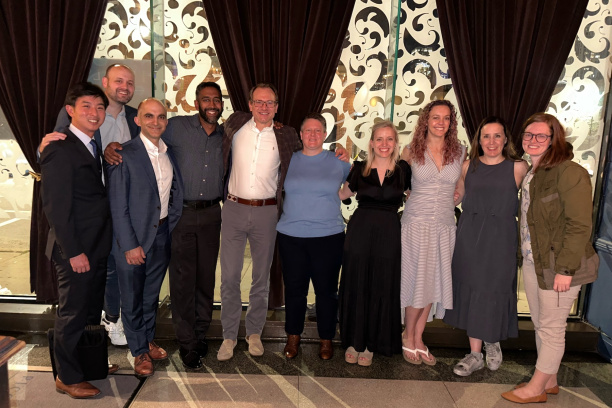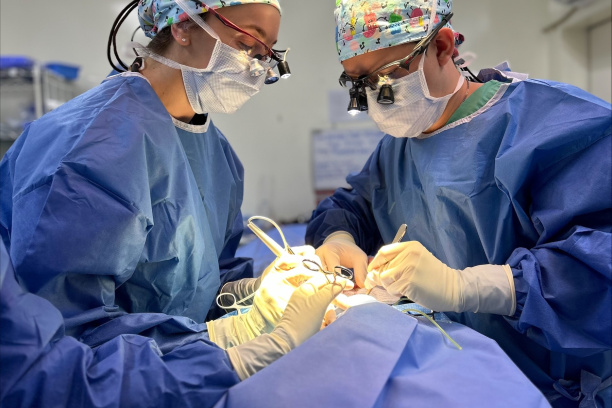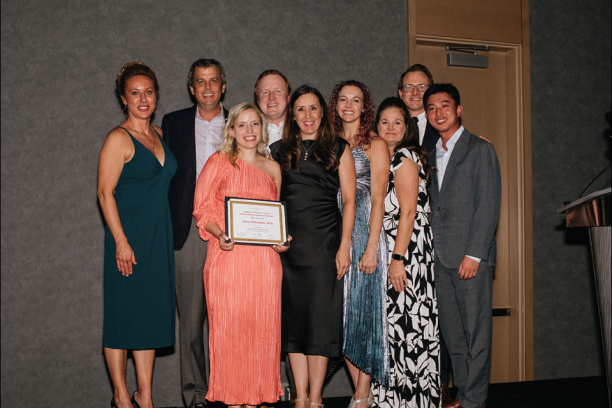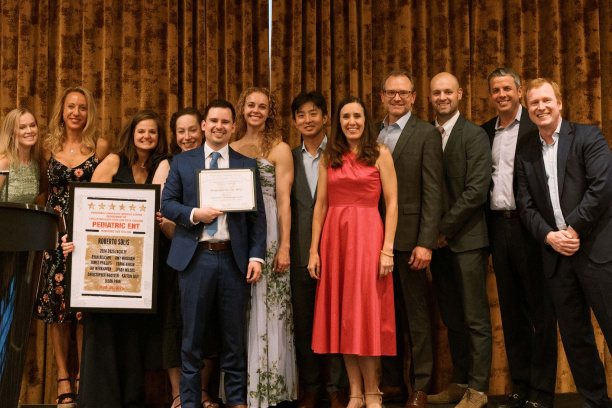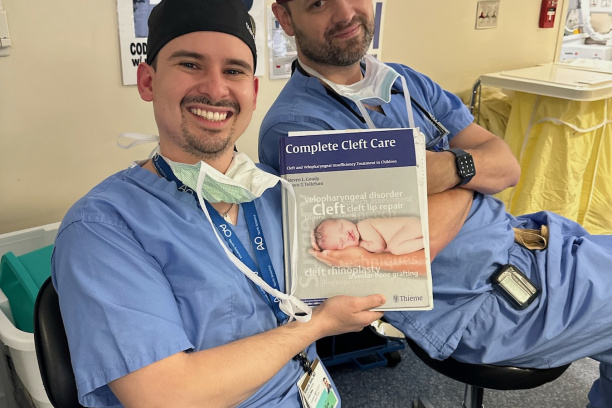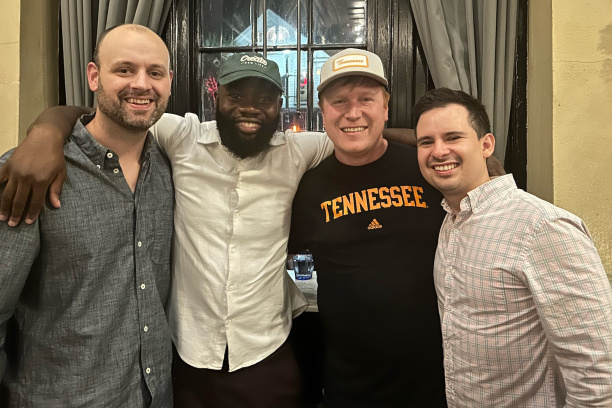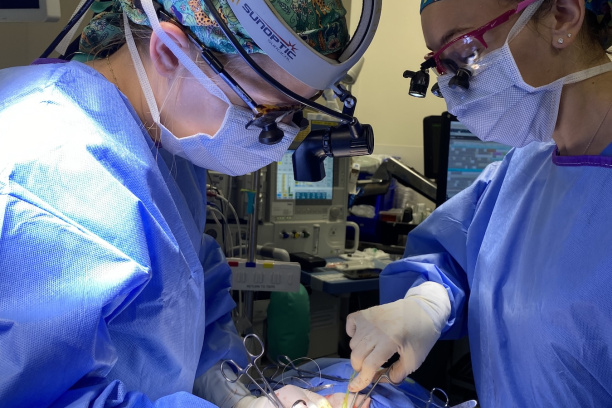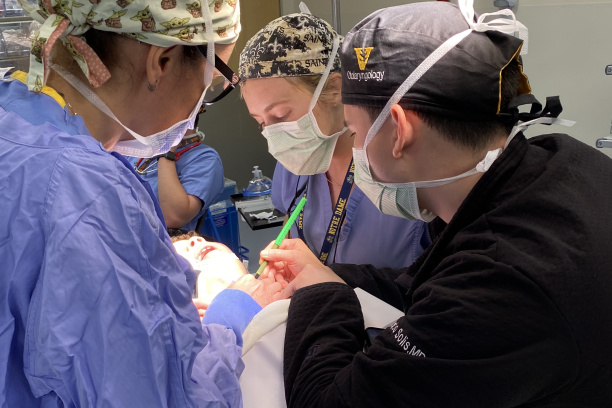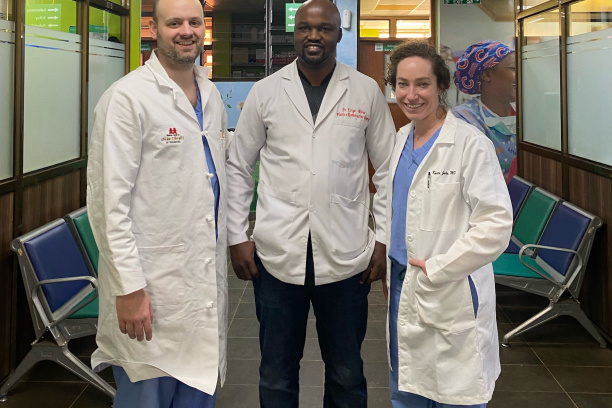Pediatric Otolaryngology-Head and Neck Surgery Fellowship
The Vanderbilt Pediatric Otolaryngology-Head and Neck Surgery Fellowship is a one-year clinical experience for physicians interested in specialized pediatric otolaryngology-head and neck surgical procedures. The Vanderbilt Pediatric Otolaryngology-Head and Neck Surgery Fellowship is accredited by the Accreditation Council for Graduate Medical Education (ACGME) and is offered through the San Francisco (SF) Match Program. Further information on our fellowship is also available from the American Society of Pediatric Otolaryngology (ASPO).
This fellowship has additional research and degree opportunities at Vanderbilt University School of Medicine. Fellows participate in research through the Vanderbilt Surgical Outcomes Center for Kids (SOCKs), which focuses on developing and improving clinical outcomes in Pediatric Surgical Sciences. Vanderbilt Pediatric Otolaryngology-Head and Neck Surgery fellows also have global outreach opportunities throughout the program.
-
The Vanderbilt Pediatric Otolaryngology-Head and Neck Fellowship covers all aspects of pediatric clinical care, including:
- Cleft lip/palate
- Vascular anomalies
- Velopharyngeal Insufficiency surgery
- Airway reconstruction and laryngeal reinnervation
- Laser therapies
- Congenital and chronic ear disease including cochlear implantation
- Sinus surgery
- Thyroid and head and neck masses
- Anterior skull base surgeries (Cerebrospinal Fluid leaks, encephaloceles, angiofibromas)
- Refractory Obstructive Sleep Apnea interventions, including hypoglossal nerve stimulation
In addition, fellows are also exposed to complex airway reconstruction in adults through Dr. Wootten's appointment in the Complex Airway Reconstruction Program.
This advanced training program allows fellows to customize their experiences to meet personal goals. The first year of the fellowship is clinical, with an optional second year encouraged. In this second year, fellows may elect one of four options:
- Master of Public Health (MPH)
- Master of Science-Clinical Investigation (MSCI)
- International mission work
- Basic science research (clinical second year would take place in the second year)
The appointment level would be that of fellow (PGY-6) with operative privileges.
The operative experience is vast and unrivaled in its breadth. Cases include cleft lip/palate repair and VPI surgery, microtia and aural atresia repair, vascular malformations, open and endoscopic airway reconstructions, chronic ear disease, cochlear implantation, sinus surgery and benign or malignant masses of the head and neck. Opportunities to participate in international mission work are available as well.
Responsibilities in the OR and clinic include:
- supervision of residents
- management of inpatient consultations
- participation in the call schedule
- involvement in a number of multidisciplinary conferences (complex aerodigestive and sleep disorders, vascular malformations, VPI/clefts, cochlear implant).
It is expected that the fellow will complete at least one publication-quality project in each fellowship year. The fellow must obtain up-to-date IRB training that includes responsible conduct of research. The faculty will help the fellow identify a critical gap in the pediatric ENT literature and propose a hypothesis-driven research project. The faculty member will assist the fellow in a formal literature search, create a data retrieval form (if a retrospective study), and design any prospective study component. Together the fellow and faculty member will write the IRB protocol and obtain approval. The fellow will perform the data analysis, with faculty supervision, hopefully leading to a research presentation at a national meeting. It will be the fellow's responsibility to write the manuscript, with faculty guidance.
Prior to fellowship commencement, each fellow will receive a calendar of duties, expectations, and assignments. There will be a specific clinic, OR, and lecture schedule to which the fellow will adhere. Expectations, as outlined to the fellow, will describe the competencies in pediatric otolaryngology necessary to complete the fellowship. Specifically, the fellow will be provided with a hard copy and an electronic copy of the expected patient care, medical knowledge, professionalism, practice-based learning, interpersonal skills, and system-based practice requirements.
-
COMPETENCY-BASED GOALS AND OBJECTIVES
I. PATIENT CARE
GOALS
- To gain expertise in the head and neck exam, and evaluation of pediatric outpatients with diseases of the head and neck
- To gain proficiency in the postoperative management of pediatric otolaryngology patients
- Gain understanding of speech, clinical and endoscopic evaluations of phonation, techniques and approaches.
- Gain expertise in the appropriate evaluation of pediatric sinus disease (acute, chronic, and complications of each) and pediatric endoscopic sinus surgery
- To gain expertise in airway endoscopy, including the ability to recognize signs of laryngopharyngeal reflux/gastroesophageal reflux, infectious, and inflammatory disorders of the airway and proficiency in related therapeutic surgical interventions (i.e. use of laser, dilation, endoscopic cleft repair)
- Gain expertise in microtia, aural atresia, cleft lip and palate evaluation and repair
- Gain experience in clinic-based frenulectomy
- Gain experience in airway evaluation using flexible endoscopy in clinic.
- Gain understanding the evaluation or velopharyngeal insufficiency and its correction (surgical and non-surgical)
- Gain understanding of management of pediatric vascular malformations (surgical and non-surgical)
- Gain expertise in endoscopic and open airway reconstruction
- Gain expertise in the evaluation of pediatric sensorineural hearing loss and the indications for cochlear implants
- To gain proficiency in the evaluation of pediatric inpatients with diseases and trauma of the head and neck (including fractures of the temporal bone and airway)
- To gain expertise in evaluation of congenital and acquired pediatric hearing loss and vestibular disorders.
- Gain expertise in basic audiologic and speech assessments and subsequent aural rehabilitation options (i.e., hearing aids, FM systems, bone anchored hearing aids).
- Gain experience in recognizing and managing acute and chronic complications of otitis media.
- To gain expertise in recognizing acute and chronic upper airway obstruction and related infectious and inflammatory diseases of the nose/pharynx/mouth
- To gain understanding of the evaluation of the pediatric patient with benign head and neck masses (i.e., cyst, malignancy, thyroid, lymphadenopathy) and subsequent surgical management
- To gain experience in the evaluation and management (medical vs. surgical) of dysphagia and sialorrhea
- To gain understanding of signs and symptoms of sleep apnea, the appropriate diagnostic tests, and subsequent medical and surgical management
OBJECTIVES
- Learn the comprehensive and focused pediatric otolaryngology history and physical and present findings in a concise and focused manner.
- Communicate effectively via written daily patient care notes and daily orders in the postoperative patient.
- Improve diagnostic skills via use of the office flexible laryngoscopy, rigid endoscope, and microscope.
- Gain proficiency in recognition, and management of pediatric otolaryngology complications.
- Gain proficiency in incision planning and simple and complex airway evaluation and reconstruction.
- Gain proficiency in incision planning and closure of various presentations of cleft lip and palate deformities.
- Gain proficiency in frenulectomy in the office setting.
- Gain proficiency in evaluation of velopharyngeal closure on perceptual and endoscopic evaluation and subsequent surgical management (i.e. z-plasty, pharyngeal flap, sphincter plasty).
- Gain proficiency in expectations, dosing and scheduling in steroid and b-blocker treatment of pediatric vascular malformations.
- Gain proficiency in understanding pathophysiology, radiology and exam finding in pediatric airway disease, the effects of reflux and inflammatory disease and reconstructive options.
- Gain proficiency in incision planning, graft material, stent choice for endoscopic and open management of pediatric airway disease.
- Perform incision planning, graft material, need for tracheotomy, need for cardiopulmonary bypass, choice of stent material, and length of post-operative intubation.
- Gain understanding of anatomy for cochlear implantation and safely perform mastoidectomy.
- Be able to present a differential diagnosis of pathologic conditions of the vestibular system and their clinical presentation and disease processes such as Ménière’s disease, benign positional vertigo, superior semicircular canal dehiscence, labyrinthine dysfunctions.
- Improve diagnostic skills in patients with complaint of hearing loss and imbalance.
- Improve diagnostic and differential diagnosis in patients with neurologic disorders including migraine and central vertigo,
- Gain proficiency in the use of the CO2, Nd:Yag, PDL lasers and appropriate laser precautions.
- Gain expertise in the use of Botox, salivary re-routing, submandibular gland removal and parotid duct ligation in the treatment of sialorrhea.
- Gain proficiency with surgical management of pediatric nasal disease including choanal atresia repair, nasolacrimal duct cyst marsupialization, balloon sinuplasty, image-guided endoscopic sinus surgery, and removal of intra-nasal and skull base tumors.
II. MEDICAL KNOWLEDGE
GOALS
- To understand ear anatomy and perform the fundamentals of pediatric otolaryngologic surgery, including endoscopic and microsurgical techniques.
- Understand head and neck anatomy and physiology as it pertains to development of the auditory system, and hearing and balance disorders. This includes medical, genetic and radiologic evaluation.
- Understand the anatomy and surgical repair of congenital craniofacial malformations (i.e., aural atresia, microtia, cleft lip/palate, micrognathia, velopharyngeal insufficiency).
- Understand the etiology and natural history of airway abnormalities and options for medical and surgical treatment.
- Understand the management of acute and chronic otitis media and associated complications with appropriate medical and surgical management.
- To gain proficiency in basic auditory anatomy and physiology with particular attention to temporal bone and auditory development.
- Understand the appropriate evaluation and treatment of pediatric allergy disease.
- To gain proficiency in sinonasal development, associated malformations, and appropriate surgical management
OBJECTIVES
- Be able to present a differential diagnosis for the patient with congenital neck masses, differentiating developmental vs. neoplastic (benign vs. malignant) with special attention to vascular malformations of the head and neck and to the differences in managing infant, childhood, and adult cases.
- Differentiate head and neck masses in infants and children with embryologic, infectious, and oncologic processes.
- Gain competency in the clinical and diagnostic evaluation of patients with craniofacial malformations and associated airway and swallowing abnormalities.
- Gain proficiency in reconstruction of congenital/acquired malformations: aural atresia, lip, palate and velopharyngeal abnormalities and post-operative management of complications.
- Be able to assess the multi-disciplinary needs of patients with congenital and acquired airway lesions and plan appropriate medical and surgical interventions.
- Gain competency in performing chronic ear and cochlear implant surgery, with special attention to congenital ear malformations.
- Be able to determine the appropriate work up of congenital sensorineural hearing loss, interpret the test results, counsel the family and recommend evidence-based treatments for the child.
- Gain proficiency in the evaluation of pediatric patients with acute and chronic sinus conditions, order appropriate diagnostic tests, and recommend appropriate medical and surgical therapy.
- Gain competency in clinical and operative airway evaluation and reconstruction with attention to related infection, inflammatory and systemic conditions (i.e., reflux) that may affect surgical outcome.
- Be able to easily interpret sleep studies in children and recommend medical and surgical therapy based on the results.
III. PROFESSIONALISM AND INTERPERSONAL COMMUNICATION SKILLS
GOALS
- Become a collaborative member of the pediatric otolaryngology healthcare team.
- Become an empathetic and trusted physician.
- Maintain a high standard of medical records keeping.
- Attend educational opportunities provided at Vanderbilt on career development and the ethical conduct of research.
- Become acquainted with referring inpatient medical services, provide timely evaluations of consult patients, and communicating with the referring service.
- Develop opportunities to participate in the resident/fellow association at Vanderbilt to ensure that fellow needs are being addressed throughout the medical center.
- Communicate with attendings, other pediatric otolaryngology care providers and patients about their healthcare in a compassionate way.
- Determine the differences between counseling children and their parents compared to adults.
OBJECTIVES
- Field consultations in a collegial manner and communicate effectively with consulting physicians.
- Work effectively and honestly with patients and their families and communicate healthcare plans to the families in terms they understand.
- Effectively utilize the medical record for pediatric otolaryngology patients, and document medical records both in the operating room and the clinic appropriately and in a timely manner.
- Attend conferences provided to resident and fellows for career development, time management, and the ethical conduct of research. The fellow will also take the appropriate IRB classes to allow him/her to conduct research in a responsible fashion.
- The fellow will get to know referring services from inpatient clinical units (i.e., PICU, NICU, hem/onc, ER, and general inpatient peds) to allow easy transfer of information, rapid response to consultation, and coordination of care on medically complex patients.
- Seek feedback from consulting services regarding professionalism and communication between the pediatric otolaryngology service and the referring service. If there are problems identified with communication or professionalism the fellow will discuss these with the fellowship director and together, they will implement a process improvement plan.
- Improve communication skills with the different ages of children and their parents who are on the pediatric ENT service.
IV. SYSTEMS-BASED PRACTICE & PRACTICE-BASED LEARNING and IMPROVEMENT
GOALS
- Understand the complexities of an integrated pediatric otolaryngology healthcare team.
- Become a collaborative member of the multi-disciplinary teams that the pediatric otolaryngology services participate in cleft lip/palate team; velopharyngeal insufficiency team; vascular malformation team; aerodigestive team; pediatric cochlear implant team.
- Understand the complexities of an integrated pediatric otolaryngology inpatient service and coordination of care with other inpatient services (i.e., NICU, PICU, Hem/Onc, Cardiology).
- Demonstrate his/her development of traits consistent with the expectations of the profession of medicine and society.
- Use information technology and other modalities to access and manage information, support patient care decisions and enhance both patient and resident education.
- The fellow will be expected to take pride in their work, provide excellent patient care, relate relevant information to other pediatric otolaryngology team members and families, and follow through on patient care.
- The fellow will participate in educational opportunities to practice otologic, sinus, and airway disease at Vanderbilt-sponsored courses when available.
OBJECTIVES
- Work effectively in the hospital and use resources in a cost-effective manner.
- Work as a collaborative member of the healthcare team to minimize the length of stay for inpatients.
- Move seamlessly between the multiple clinic sites and Hospital OR site in an efficient manner.
- Understanding the speech pathologist and audiologist’s perspective in their role as part of the pediatric otolaryngology team from speech and swallowing evaluations to rehabilitation via hearing aids, implantable devices, bone anchored hearing aids and cochlear implants.
- Understanding the business model and economic issues of rehabilitation will be addressed.
- Work as a collaborative member of the pediatric otolaryngology service to effect positive communication and improve patient outcomes with other medical and surgical services.
- The fellow will be expected to: make every effort to provide the best care possible; review and evaluate practice performance; seek feedback from attendings and colleagues, identify opportunities for improvement, pursue learning activities focused on improvement (reading, conversations with attendings/peers, use of on-line educational material, participating in formal educational activities).
- In communication with patients and their families, the fellow will consistently establish a rapport with the patient and staff caring for the patient.
- The fellow will work as an effective team member with staff, nurses, educators, coordinators, surgical technicians, referring physicians, and attendings.
- The fellow will present data and cases in a logical, focused manner with appropriate assessments and medical/surgical plans which are appropriately documented in the patient’s chart.
- The fellow will attend the temporal bone course and airway endoscopy/sinus course if they are offered. During these courses, the fellow will act as a mentor for residents performing basic procedures (i.e., mastoidectomy or airway endoscopy) and will learn from attendings in more complex lab procedures (i.e., facial recess drilling or cricotracheal resection).
-
Applicants interested in the Vanderbilt Pediatric Otolaryngology Fellowship must meet the following requirements:
1. Physician currently in or has completed an Otolaryngology–Head and Neck Surgery residency program.
- Program must be accredited by the Accreditation Council for Graduate Medical Education (ACGME).
- If in Canada, the applicant must have successfully completed an Otolaryngology-Head and Neck Surgery residency program accredited by the RCPSC (Pediatric Otolaryngology Program Requirements III.A.).
- ECFMG certification is required for International Medical Graduates who come to Vanderbilt for clinical training. ECFMG is an authorized agency to sponsor a J-1 visa. For the purpose of residency/fellowship training, Vanderbilt accepts J-1 visas only.
2. A valid full (not training) Tennessee medical license is required at the start of the fellowship.
Applications must be submitted through SF Match Residency and Fellowship Matching Services. We also require three letters of recommendation and your current CV.
2026 Interview Dates: March 24 and April 2
-
The primary reference used in our didactic sessions will be Pediatric Otolaryngology by Bluestone and Stool. A copy of this text is available the fellow workspace, and it is also available online through the Eskind Biomedical Library (EBL). The EBL is open 24 hours a day, seven days a week. Additional books will be available in faculty offices. Articles for the monthly journal clubs will be available through the medical library.
Fellows are encouraged to perform literature searches through the EBL. Online courses are available for IRB training. Each fellow will be expected to complete a publication-worthy project at the completion of training. Our electronic medical record system is well positioned to perform patient data analysis for chart reviews. There are weekly statistical clinics in the medical center complex where fellows may seek statistical assistance.
Each week fellows will be provided with a minimum of a half day for academic duties. The clinical volume is sufficient to meet fellows' needs. The primary pediatric attendings will see an average of 10,000 outpatients and perform more than 2,500 surgeries annually, with other department members managing another 700 cases.
-
#1 Children’s Hospital
Monroe Carell Jr. Children's Hospital at Vanderbilt opened in 2004. U.S. News and World Report has repeatedly ranked the hospital #1 in Tennessee and the Southeast in 10 pediatric specialties. The Pediatric Otolaryngology clinic within the hospital opened in December 2009.
Ancillary services are world-class. The Department of Speech & Hearing and its Division of Audiology are among the top in the nation. Radiology, Pathology and Anesthesia services work closely with Otolaryngology–Head and Neck Surgery to ensure optimal patient care. There is a very congenial atmosphere within the department as well as between disciplines.
-
1. Each attending physician and selected hospital staff member completes a quarterly evaluation of the fellow. The program director reviews these evaluations and discusses them with the fellow at the biannual evaluation.
2. Twice a year, the fellow has a mandatory conference with the program director for evaluation and review of operative case logs. The fellow will also provide an assessment of the program. Discussion will cover the above topics as well as future plans and goals.
3. Attendance at teaching conferences is mandatory. The full-time faculty will systematically evaluate participation consistency and quality. The fellow will receive feedback in this area at the biannual evaluations.
4. The full-time faculty will also systematically review participation consistency and quality in patient rounds and scrubbed-in operating room attendance. The fellow will receive feedback in this area at the biannual evaluations.
5. Each fellow must accurately complete and submit a summary of operative experience in December and June. The chairman and program director review this report biannually.
6. Residents are expected to complete annual faculty assessments. The program director and chairman review these results. Each faculty member receives a summary report to discuss results with the fellow.
7. Resident program and faculty evaluations are critical to the teaching program's continued improvement, and are taken seriously. These evaluations are usually anonymous, but may be done in person if desired. The program director is also always immediately available should there be any professional or personal problems that need immediate attention.
-
Vanderbilt Pediatric Otolaryngology-Head & Neck Surgery fellows become leaders in the field, both in academic and clinical settings. Current and past fellows include:
- 2010-2011: Beth Williamson, MD (Texas Children’s Hospital, Baylor College of Medicine, Houston)
- 2011-2012: Siva Chinnadurai, MD, MPH (Children’s Minnesota, Minneapolis)
- 2012-2013: Noel Jabbour, MD, MS (University of Pittsburgh, Fellowship Director of Division of Pediatric Otolaryngology, Pittsburgh)
- 2013-2014: David Crockett, MD (Phoenix Children’s Hospital, Phoenix)
- 2014-2015: Lourdes Quintanilla-Dieck, MD (Oregon Health & Science University, Pediatric Otolaryngology Division, Portland, Or.; Co-Director of the Multidisciplinary Pediatric Thyroid Nodule Clinic at Doernbecher Children's Hospital)
- 2015-2016: Adrienne Childers, MB, MBA (Saint Louis University, Pediatric Otolaryngology Division, St. Louis)
- 2016-2017: Alexis Korostoff Rieber, MD (Huntington Memorial Hospital, Pasadena, Calif.)
- 2017-2018: Alycia Spinner, MD (University of Nevada Las Vegas, Pediatric Otolaryngology Division)
- 2018-2019: Ryan Belcher, MD, MPH (Monroe Carell Jr. Children’s Hospital at Vanderbilt, Vanderbilt University Medical Center, Nashville; Vanderbilt Cleft and Craniofacial Team; Surgery Co-director, Vanderbilt Children’s Pediatric Thyroid Nodule and Cancer Program)
- 2019-2020: Peter Karempelis, MD (Pediatric Ear, Nose, & Throat Specialists, St. Petersburg, Fla.; also affiliated with Johns Hopkins All Children’s Hospital in St. Petersburg)
- 2020-2021: Heather Koehn, MD (Augusta University's Children's Hospital of Georgia, Medical College of Georgia in Augusta)
- 2021-2022: Elizabeth Grier Gardner De Laureal, MD (Ochsner Health, Ochsner Hospital for Children, New Orleans)
- 2022-2023: Kaitlin July, MD - Assistant Professor, Monroe Carell Jr. Children's Hospital at Vanderbilt, Director of Complex Dysphagia Management Clinic
- 2023-2024: Laura Petrauska, MD - Children’s Hospital New Orleans, New Orleans
- 2024-2025: Roberto Solis, MD - Driscoll Children’s Hospital, McAllen, Texas
- 2025-2026: Jordan Luttrell, MD
-
Selected articles to which our pediatric OHNS faculty and fellows have contributed:
- “Pearls from your peers: attending the worst case scenarios (WCS) Course” (AAO-HNS Bulletin, November 2024)
- “Stories from the Road: AIC-CURE Children’s Hospital of Kenya” (AAO-HNS Bulletin, January 2025)
- "For Patients: KidsENT Health Month: Epistaxis" (AAO-HNS Bulletin, February 2020, Vol. 39, No. 1)
- "Kids ENT Health Month: Ankyloglossia" (AAO-HNS Bulletin, February 2019, Vol. 38, No. 1)
- "Kids ENT Health Month: Awareness of the dangers of button battery ingestion in children" (AAO-HNS Bulletin, February 2018, Vol. 37, No. 1)
- "Learn the ABCs of adenoids" (My Southern Health, 11 January 2017)
- "What to know about tonsillectomies for children" (My Southern Health, 30 November 2016)
Selected articles about our pediatric OHNS faculty and fellows:
- “Repeat Audiologic Testing Before Cleft Palate Repair” (VUMC Discoveries, November 2023)
- “Study shows parathyroid gland preimplantation technique an effective option to restore function in children” (VUMC News, April 2025)
- “Implantable device helps young patients with obstructive sleep apnea” (VUMC News, May 2025)
- "Household income, maternal health among factors tied to craniofacial clefts” (VUMC Discover, 17 November 2022)
- "Back in the saddle: Comprehensive team helps children with complex thyroid conditions and cancer" (Hope Magazine, 17 March 2022)
- "Virtual Visit Program Widens Options for Faculty, Prospective Residents" (VUMC Discover, 9 March 2022)
- "Virtual tours boost Otolaryngology resident recruiting" (VUMC Reporter, 17 February 2022)
- "Spotlight: Humanitarian Efforts | Ryan H. Belcher, MD, MPH" (AAO-HNS Bulletin, 7 Oct 2021)
- "Academy for Excellence in Education elects 28 new members" (Amy Whigham elected to academy) (VUMC Reporter, 16 June 2021)
- "Belcher named to newspaper’s list of 40 under 40" (VUMC Reporter, 11 Feb 2021)
- "Alumni and faculty among Nashville Business Journal ’40 under 40′ honorees" (Vanderbilt News, 12 January 2021)
- "Section Spotlight: Young Physicians Section (YPS)" (Lyndy Wilcox named ABOHNS Liaison) (AAO-HNS Bulletin, December 2020/January 2021, Vol. 39, No. 11)
- "New Physician Spotlight: Ryan Belcher, MD" (VUMC Reporter, 12 August 2019)
- "Obesity Puts More Children at Risk for OSA" (VUMC Discover, 22 May 2019)
- "Directorships honor leaders, philanthropic partners" (VUMC Reporter, 25 April 2019)
- "Improved Mandibular Distraction Technique for Pierre Robin Sequence" (VUMC Discover, 25 March 2019)
- "Complex Airway Disease: Advances in Treatment for Laryngeal Stenosis" (VUMC Discover, 4 January 2019)
- "Faculty Highlight: Amy Whigham MD" (SOCKS, 4 May 2016)
- "Wootten named to lead Pediatric Otolaryngology" (VUMC Reporter, 9 October 2014)
